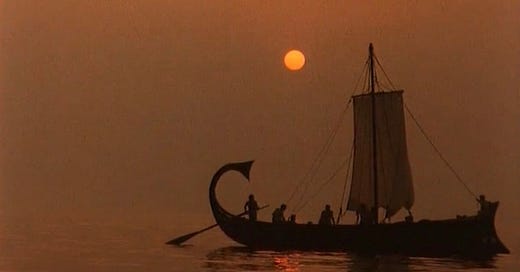Weekly Watches: March 13, 2024
Sharing Our Recent Discoveries: Weekly Watches with 100 Movies Every Catholic Should See
Nostos: il ritorno (1989)
Directed by Franco Piavoli
By
How do you translate Homer’s Odyssey into film when it relies on the written word for its narrative power? Italian filmmaker Franco Piavoli chose instead to abandon the written word altogether and craft a visual poem based on Homer that relies solely on film language. With barely a line of dialogue (the only spoken lines are a fictional Greek-inspired language), Piavoli makes full use of sound and image to create a stunning meditation on man’s longing for home. While watching, I was reminded of Terrence Malick’s ability to transcend traditional narrative filmmaking (though this has a linear story) and instead convey the inner life of characters through symbolic images. While many events of The Odyssey are trimmed out of the short 85-minute runtime, this works to instead focus on the visualized interior world of Odysseus.
An emphasis on human memory persists through the film, with Odysseus experiencing flashbacks to the Trojan War, his youth, his joys and his regrets. His memory is as vast and unpredictable as the ocean he sails. There is little focus on victory in battle, but instead a remembrance of the fallen, and these memories of the slain haunt the weary king, their voices echoing in his ears. All these recognitions of life and death work to awaken the wandering hero to his lost purpose. Washed from shore to shore, the memory of his wife Penelope becomes an anchor, recentering his soul amidst the storms, the temptations and the regrets. What Piavoli achieves through the sights and sounds of the natural world is a breathtaking reminder of our role as wanderers on this earth, and through the life-giving waters of memory, awakens the wanderer to his forgotten purpose. It made this viewer long for home.
The Killing Fields (1984)
Directed by Rolland Joffé
By Cameron DeLaFleur
Stories that honor the tenacity of the human spirit and the bonds of friendship amidst unspeakable horrors deserve to be told. All will be brought to light with time. Rolland Joffé’s (a name you may recognize as the director of The Mission) The Killing Fields offers a glimpse into one such episode, the Cambodian genocide under the Khmer Rouge in the 1970s. Released less than a decade from the actual historical events, the film bears a sense of gritty realism that few others on such sobering topics can. Many Cambodians were employed in the production, including Haing Ngor, who channeled his own vivid memories of the atrocities to deliver a sincere and wrenching performance, landing him an Oscar for his big-screen debut.
The film can be broken into two main acts. The first follows Dith Phan (Ngor) and American Journalist Sam Waterson’s attempt to escape the onset of the Khmer Rouge’s bloody regime while bringing to light American bombing that had begun targeting Cambodia during the Vietnam War. It’s a thrilling affair where the brotherly bond of these two men is powerfully cemented. The narrative cohesion and emotional thrust loose a bit of steam in the second half, which focuses almost exclusively on Phan’s enslavement and escape from under the brutal Khmer Rouge. While the production value and chilling depiction of the atrocities remain highly effective, the film could have benefited in spending more energy to continue to develop on the ties of friendship between the two men while Waterson tried to facilitate Phan’s rescue from afar. I would point to Guy Richie’s The Covenant if one is looking for stronger emotional cohesion in a very similar scenario. Flaws aside, The Killing Fields remains a powerful, landmark film which brought Phan’s remarkable story to the public eye and continued to spread awareness of this sobering chapter of human history.
Twin Peaks: The Return (2017) (TV Series)
Directed by David Lynch
By Ezra Cook
The release of Twin Peaks in 1991 changed television forever. It was something new and exciting that audiences had never seen before. What at first glance came across as a police procedural drama, in reality, was much more. Blending many genres, at times being soap opera-like and at times being almost a comedy, all expectations were diverted. Twin Peaks exists in a world almost parallel to ours. At first, everything appears mostly normal; however, the deeper into the show you find yourself, the weirder it all reveals itself to be. After the original two seasons of the show, which co-creator David Lynch was not all that happy with (particularly season 2), Lynch returned for a prequel movie, Fire Walk With Me. This film follows the story of how the show's central mystery came into existence. A disturbing and violent film, to be sure, but one of great emotional impact, and even some strong biblical parallels.
Twin Peaks: The Return is the result of what happens when David Lynch has full creative control. Sure, it was still co-written by co-creator Mark Frost; however, with David Lynch being a solidified Hollywood icon, he had the chance to operate with almost no network restrictions. This is both good and bad. The show, at times, goes into full surrealism while still remaining somewhat grounded in reality, for the most part. I love The Return, but I unfortunately do not love it as much as I love the other projects from the Twin Peaks universe. On a technical level, this show surpasses any of its predecessors; however, on an emotional level, I struggled to connect at times. To try to give some plot synopsis or analysis would be a futile attempt at best. The content of this show goes places no one could predict and really only makes any kind of sense within the context of itself. All in all, I found myself somewhat underwhelmed but still happy with The Return. For any die-hard Twin Peaks fans this is a definitive must-watch series. Be warned, however, that this show is not the same as the original two seasons. It is much stranger, more violent, and has more sexual content than anything else in the Twin Peaks universe, including Fire Walk With Me.
The Bear (2022) (TV Series)
Directed by Christopher Storer, Joanna Calo and Ramy Youssef
By
This past weekend, I had friends staying with me, and they mentioned they hadn’t finished the second season of FX’s The Bear. Obviously, the only possible reaction was to immediately cancel all plans and help them finish it. The Bear is deserving of a much longer deep dive at some point, with its sharp writing, dynamic camerawork, masterful performances, and beating heart making it one of — if not the best — shows currently on television. In the meantime, however, I specifically want to draw attention to the mid-season episode, “Forks.”
“Forks” focuses almost entirely on the character of Richie, played by Ebon Moss-Bachrach. For most of the show, Richie has been insecure, prone to violent outbursts, and eager to belittle anyone who questions his judgement. The reasons why he is this way I don’t want to spoil, but “Forks” gives him a showcase to transform into something more. In the process, the show transforms as well. Rarely, at least in today’s media landscape, has 30 minutes of television produced as many smiles, as many cheers, and as many tears at seeing a broken man discover his life still has purpose.
Up to this point, The Bear was most famous for the phrase, “yes, chef.” By the end of “Forks,” the show is given a new, more meaningful mantra: “every second counts.”











